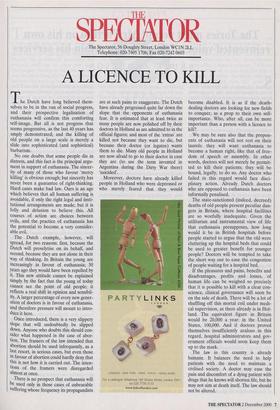A LICENCE TO KILL
The Dutch have long believed them- selves to be in the van of social progress, and their prospective legalisation of euthanasia will confirm this comforting self-image. But all is not progress that seems progressive, as the last 40 years has amply demonstrated; and the killing of old people on a large scale is merely a slide into sophisticated (and sophistical) barbarism.
No one doubts that some people die in distress, and this fact is the principal argu- ment in support of euthanasia. The sincer- ity of many of those who favour `mercy killing' is obvious enough; but sincerity has never been a guarantee of right-thinking. Hard cases make bad law. Ours is an age which believes that all human suffering is avoidable, if only the right legal and insti- tutional arrangements are made; but it is folly and delusion to believe this. All courses of action are choices between evils, and the practice of euthanasia has the potential to become a very consider- able evil.
The Dutch example, however, will spread, for two reasons: first, because the Dutch will proselytise on its behalf, and second, because they are not alone in their way of thinking. In Britain the young are increasingly in favour of euthanasia; 50 years ago they would have been repelled by it. This new attitude cannot be explained simply by the fact that the young of today cannot see the point of old people; it reflects a real shift in opinion and sensibil- ity. A larger percentage of every new gener- ation of doctors is in favour of euthanasia, and therefore pressure will mount to intro- duce it here.
Once introduced, there is a very slippery Slope that will undoubtedly be slipped down. Anyone who doubts this should con- sider what happened in the case of abor- tion. The framers of the law intended that abortion should be used infrequently, as a last resort, in serious cases, but even those in favour of abortion could hardly deny that this is not how it is carried out. The inten- tions of the framers were disregarded almost at once.
There is no prospect that euthanasia will be used only in those cases of unbearable suffering whose frequency its propagandists are at such pains to exaggerate. The Dutch have already progressed quite far down the slope that the opponents of euthanasia fear. It is estimated that at least twice as many people are now polished off by their doctors in Holland as are admitted to in the official figures; and most of the 'extras' are killed not because they want to die, but because their doctor (or legatee) wants them to die. Many old people in Holland are now afraid to go to their doctor in case they are (to use the term invented in Argentina during the Dirty War there) `suicided'.
Moreover, doctors have already killed people in Holland who were depressed or who merely feared that they would become disabled. It is as if the death- dealing doctors are looking for new fields to conquer, as a prop to their own self- importance. Who, after all, can be more important than a person with a licence to kill?
We may be sure also that the propon- ents of euthanasia will not rest on their laurels: they will want euthanasia to become a human right, like that of free- dom of speech or assembly. In other words, doctors will not merely be permit- ted to kill their patients; they will be bound, legally, to do so. Any doctor who failed in this regard would face disci- plinary action. Already Dutch doctors who are opposed to euthanasia have been informally penalised.
The state-sanctioned (indeed, decreed) deaths of old people present peculiar dan- gers in Britain, where hospital facilities are so woefully inadequate. Given the utilitarian and instrumental view of life that euthanasia presupposes, how long would it be in British hospitals before people started to argue that the old were cluttering up the hospital beds that could be used to greater benefit for younger people? Doctors will be tempted to take the short way out to ease the congestion of people waiting for a hospital bed.
If the pleasures and pains, benefits and disadvantages, profits and losses, 'of human life can be weighed so precisely that it is possible to kill with a clear con- science, clinical governance will soon be on the side of death. There will be a lot of shuffling off this mortal coil under medi- cal supervision, as there already is in Hol- land. The equivalent figure in Britain would be 20,000 a year: in the United States, 100,000. And if doctors proved themselves insufficiently zealous in this regard, hospital administrators and gov- ernment officials would soon keep them up to the mark.
The law in this country is already humane. It balances the need to help patients with the need to maintain a civilised society. A doctor may ease the pain and discomfort of a dying patient with drugs that he knows will shorten life, but he may not aim at death itself. The law should not be altered.


















































































 Previous page
Previous page